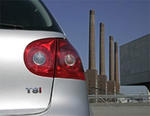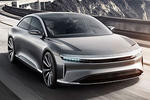
Volkswagen announced that they can meet EU's very strict CO2 emissions regulations. VW is counting on their TDI and TSI engines and DSG transmissions to boost their CO2 emissions efficiency.
Volkswagen also stated they expect EU to create a balanced conditions so that European manufacturers can put their global competitiveness to the test.
Volkswagen Press Release:
Volkswagen on the CO2 regulation decision of the EU Commission:
An integrated approach is essential
The Commission overshoots economically beneficial targets by far.
Wolfsburg, 19 December 2007 - the decision of the EU Commission on CO2 regulation published today poses severe challenges for European carmakers. In future, especially German manufacturers will bear the brunt of CO2 reduction. Volkswagen is prepared to face up to the challenges of climate protection with innovative, cost-effective technologies. Thanks to innovative technologies such as TDI and TSI engines and DSG transmissions, Volkswagen models boast the highest CO2 efficiency.
However, the Group expects legislators to create balanced, comprehensible conditions so that European manufacturers can put their global competitiveness to the test in the future and offer customers a broad range of models meeting all mobility needs at affordable prices.
Volkswagen supports the regulatory model proposed by the EU because it generally takes into account the variety of customers' wishes in Europe. However the innovation capabilities of German car manufacturers and the process of technology transfer, which normally proceeds from the premium and luxury classes to high-volume models,
will be severely impaired by unacceptable burdens. Similarly, the competitiveness of European high-volume manufacturers and component suppliers will be adversely affected; in future, they will face severe competition from low-cost non-European manufacturers.
The penalties proposed by the EU Commission for exceeding future limits are far removed from a CO2 reduction strategy that is efficient in terms of the overall economy and also viable for businesses. What is needed is a system that is fair and realistic, can be implemented within the
proposed time frame and does not create disproportionate burdens for German carmakers compared with their European competitors. It will be appropriate for all manufacturers to tap the economically viable potentials for CO2 reduction available in all vehicle segments.
All participants in road traffic should contribute to climate protection. It will be necessary to implement the integrated approach agreed with the EU Commission in 2005, which included not only the oil industry but also biofuel producers, infrastructure operators and drivers themselves.
What is needed is a technology-neutral regulatory approach that takes into consideration not only
all the technical innovations in the official European driving cycle but also all the technical and non-technical achievements of manufacturers outside the driving cycle, including vehicles with intelligent communication systems and driver education. Volkswagen supports calls by the German government for high flexibility in reaching the reduction target of 130 g CO2/km and expects legislation to provide appropriate leeway as regards the reduction measures to be taken. The objective must be to ensure the highest possible degree of economic viability in climate protection and to stimulate the development of innovative technologies.











